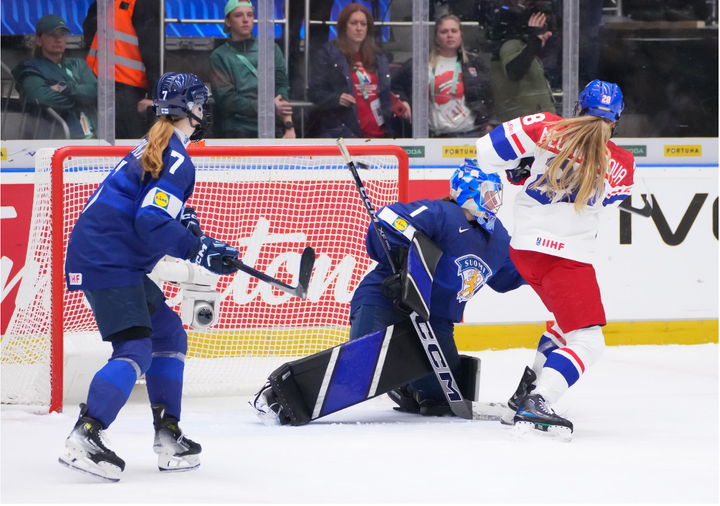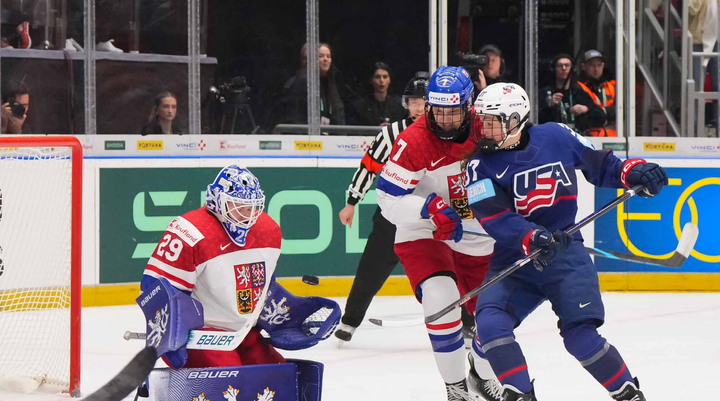Rewind: Defense wasn’t enough for Canada in 2005
Sometimes defense doesn’t win championships
Defense wins championships — except when it doesn’t.
Heading into the 2005 IIHF World Championship in Linköping and Norrköping, Sweden the Canadian women’s national team was all but unstoppable. At the time, Canada had won every Women’s World Championship to date and seven of nine Four Nations Cups. Team Canada boasted four current members of the Hockey Hall of Fame — Hayley Wickenheiser, Jayna Hefford, Danielle Goyette, and Kim St. Louis — in addition to two other icons in Caroline Ouellette and Jennifer Botterill who will likely join them in the Hall. And that was just the tip of the iceberg in terms of how much talent and experience was on this squad.
Clearly, Team Canada’s 2005 Worlds roster was one of the strongest national teams in the history of the sport. A gold medal seemed all but inevitable and, right out of the gate, the Canadians lived up to the hype and then some.
Group Domination
Canada obliterated the competition in the group stage. They dismantled Kazakhstan 13-0 before routing Russia 12-0 and a strong Swedish squad 10-0. It’s worth noting that Russia was not the team it is today back in 2005. The Russians won bronze at the 2001 Worlds in Minnesota, but had not had similar success before or after that strong showing. After being flattened by Canada, the Russian national team went on to finish 8th at the 2005 Worlds.
However, Canada’s 10-0 win over Sweden was a statement. Sweden won bronze at the 2002 Olympics and had finished fourth in three of the last four World Championships heading into the 2005 Worlds. Sweden was led by Maria Rooth, Erika Holst, Elin Holmlöv, and veteran defender Gunilla Andersson. Rooth is a member of the IIHF Hall of Fame and, if there’s any sense in the world, both she and Holst will end up in the HHOF. Although the Swedes lost in their semifinal game against Team USA by a score of 4-1, they went on to secure a bronze medal.
In group play, Canada out-shot the opposition by a margin of 145 to 23, and started the tournament by out-shooting Kazakhstan 55-2. Yes. In 60 minutes of World Championship play, Team Canada conceded just two shots — theoretically, they would have won without playing a goaltender. That’s just downright silly. I think we can call that two-save performance the easiest shutout of St. Pierre’s international career.
Canada looked absolutely unbeatable. They were well on their way to a ninth consecutive World Championship gold medal.
Finland Goes Down Fighting
Things went quite differently for Canada in the semifinal against Finland.
The offense that had hit double digits in goals in every game of the group stage hit a snag against the Finns. For the first time all tournament, Team Canada’s power play failed to score after delivering four goals in each of the first three games. Interestingly enough, Canada took more penalties than Finland (six minors to four) in the semifinal but the +25 shot differential suggests that the Canadians still dominated in possession.
Finland’s discipline, strong penalty killing, and goaltender Annakaisa Piiroinen kept the game close. That was a quite feat after the Finns managed just two shots on goal in the first period. All things considered, the Finns fared much better against Canada than they did against Team USA two days earlier on Apr. 6. USA enjoyed a +35 shot differential and buried the Finns in an 8-1 victory. So, it was somewhat surprising to see Canada’s superpowered offense produce just three goals and fail to convert on four power play opportunities.
Appropriately, it was Wickenheiser and Hefford who broke through and got Canada on the scoreboard. Wick scored the first goal of the game a little over three minutes into the second period and Hefford scored the next two goals to secure Canada’s place in the gold medal game against — you guessed it — the Americans.
A Shocking Silver Finish
Team USA had blazed their own trail to the gold medal game. USA scored 23 goals in the group stage and defeated Sweden 4-1 in the semifinal to punch their ticket to the final. Through their first four games of the tournament, USA had fewer goals than their neighbors to the North, but averaged 48.5 SF60; Canada averaged 46.5 SF60. That’s a small margin but using surface-level team data, it’s clear that Canada had the easier path to the gold medal game.
The American roster was just as stacked as Team Canada. HHOFers Angela Ruggiero and Cammi Granato headlined a squad that featured icons like Jenny Potter, Julie Chu, Natalie Darwitz, Katie King Crowley, and Krissy Wendell-Pohl, who led the squad with nine points and was eventually named the tournament’s MVP. Yeah, Canada was in for a fight.
It didn’t take long for it to become clear that this game would be a goalie duel. Chanda Gunn and especially Kim St. Pierre were brick walls. St. Pierre made 26 stops through the first 40 minutes of the game alone as a result of USA out-shooting Canada 26-13 through the first two periods. She made 14 more saves in the third to finish regulation with 40 saves to preserve her shutout streak to 180 minutes. Ruggiero and Granato were particularly dangerous. They finished regulation with a combined 13 shots with Ruggiero leading all skaters by forcing St. Pierre to make seven saves on her heavy shots.
The referees let the two superpowers play, calling just two penalties in the final two periods of regulation and a penalty on each team in overtime. But both goalies and penalty killing units were equal to the task. The gold medal game had to be settled in a shootout.
With two nations of people sitting on the edge of their seats, Ruggiero scored the goal that earned USA its first World Championship gold medal. Team Canada’s players were devastated. Captain Cassie Campbell and her teammates were in tears when unwelcome silver medals were placed over their heads. Canada’s golden streak had ended.
Canada’s defense and goaltending at the 2005 IIHF World Championship was as close to perfection as we may ever see, but, in the end, it didn’t matter. The star-studded power play that looked unstoppable in the group stage was stopped for a second straight game — and when it mattered most. Team USA outshot Team Canada 49-26 in 80 minutes of hockey after Canada averaged 46.5 shots per game through the first four games of the tournament. The offense that ran over Kazakhstan, Russia, Sweden, and scored three times against Finland couldn’t solve Team USA.
Superb defense and Hall of Fame caliber goaltending just wasn’t enough. Hockey can be a cruel, cold game.





Comments ()